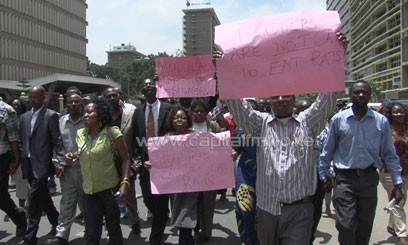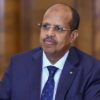
The survey shows that 27 percent of teachers are usually in school but not in classrooms, 16 percent absent from school and 2 percent in class but not teaching/FILE
The survey shows that 27 percent of teachers are usually in school but not in classrooms, 16 percent absent from school and 2 percent in class but not teaching.
Releasing the study, Africa Growth Initiative Director at Brookings Institution in Washington Mwangi Kimenyi, said the biggest concern was that despite having 55 percent of teachers in class, pupils in public schools were still performing poorly compared to private schools.
In private primary schools, only 31 percent of teachers are absent in school.
“Public school teachers are more qualified than those in private schools. But in terms of the delivery, you find that you have much better outcome from the private schools. This is not because there is better infrastructure in private schools, but teachers are more active and perhaps motivated,” Kimenyi said.
It has revealed that teachers who are likely to be absent in both public and private schools include those with seniority, who are better educated, experienced and who reside from the district where they teach.
The study showed that time spent in teaching in all primary schools per day by teachers was two hours and 40 minutes. In public schools, teachers spent two hours 19 minutes compared to two hours and 28 minutes in private schools.
“Excluding head teachers and principals, 64 percent of male teachers with permanent contract were likely to be absent from schools compared to 33 percent of females,” the study showed.
Ninety-five percent of all schools had the required teaching equipment but only 58 percent had the proper infrastructure.
Teachers’ knowledge of the subjects they teach was relatively modest and the pedagogical skills to transform their knowledge into meaningful teaching was worryingly low at 35 percent in public schools and 49 percent in private schools.
The study comes at a time when public primary school teachers under the Kenya National Union of Teachers (KNUT) are on strike demanding Sh47 billion in allowances from the government.
Meanwhile on the health sector in Kenya, the study showed a big gap was in lack of many health providers both in private and public health facilities being able to give the required full treatment.
Only 54 percent of doctors can be able to give full and proper treatment in all health facilities.
Twenty seven percent of all health care service providers including in health facilities are absent every day, with 29 percent in public health care facilities and 21 in private facilities.
The survey instruments were piloted in Tanzania and Senegal and officially rolled out in Kenya this year. The countries to follow will include Mozambique, Nigeria, Togo and Uganda.














































